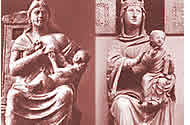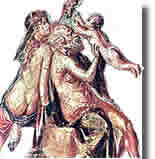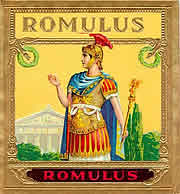Christians claim the miraculous Christmas story of the Nativity and all its trappings as unique to their own particular heresy, apparently as unaware of the story’s origins as they are of its paucity of even Biblical support—failing to notice that that there is nothing at all miraculous in Paul’s two quite minor references to Jesus’ birth (the earliest written reference), nothing at all in Mark (the earliest Gospel), two quite different and incompatible versions of the birth written later and attributed to Matthew and Luke (prompting many historians to contemplate how much of these Nativity stories was manufactured), and nothing at all in John—the last of the four Gospels to be written (around 100AD) suggesting perhaps that not even this gospel’s authors were prepared to take Matthew and Luke’s manufactured mythology seriously.
Between them, Matthew and Luke made up a beautiful story:
- a miraculous birth,
- in a humble place,
- of a youngster of impressive genealogy,
- accompanied by a tremendous star
- and (in Luke) a heavenly choir,
- recognition of the divine child by
passing vagrantswise men - and their presentation of gifts,
- and the slaughter of innocents by a king fearing the child might displace his crown.
But their story wasn’t made up out of whole cloth. It was put together from earlier myths and legends, and the stories of other religions, with many which they and their readers would have been familiar (Q: What’s mythology? A: Someone else’s religion), either because the early Christian authors thought if their godchild were to be taken seriously in a world of competing gods needed the sort of of stories about his birth that other gods had, because they thought these were cool stories—or because they lacked the imagination to make up their own.
I’m going to look at the pagan origin each of these Myths one day at a time*.
 Today, the Myth of the Miraculous Birth:
Today, the Myth of the Miraculous Birth:
The Virgin Birth Myth appears everywhere: in American Indian mythologies, in Greek, Roman, Norse, Indian, Asian and even New Zealand mythology. It’s ubiquitous—and not just because everyone copied.
It appears in Indian myth in the form of Heri Chrishna, or Crishna the Saviour, born of the chaste virgin Devaki, selected on account of her purity, begotten by the deity Vishnu, and said to be “the very person of Vishnu himself in human form.”
Thai mythology has a virgin-born god and saviour called Codon, his mother, a beautiful young virgin, was “impregnated with sunbeams” while out praying one day.
.jpg) In Buddhist mythology, The Buddha was born of the Virgin Maya, or Mary, after the divine power called “The Holy Ghost” was said to have descended on her in the form of a white elephant! (A little like the session with a white bull enjoyed by Pasiphae, the mother of the Minotaur, but with seemingly more pleasant results.) Like someone else we could mention, it was said of the Buddha“He in mercy left paradise, and came down to earth because he was filled with compassion for the sins and miseries of mankind.” From the time of his birth however, Maya’s womb was sealed up “like a casket in which a relic is placed” and she lived thereafter as a perpetual virgin. So it didn’t all end well for her.
In Buddhist mythology, The Buddha was born of the Virgin Maya, or Mary, after the divine power called “The Holy Ghost” was said to have descended on her in the form of a white elephant! (A little like the session with a white bull enjoyed by Pasiphae, the mother of the Minotaur, but with seemingly more pleasant results.) Like someone else we could mention, it was said of the Buddha“He in mercy left paradise, and came down to earth because he was filled with compassion for the sins and miseries of mankind.” From the time of his birth however, Maya’s womb was sealed up “like a casket in which a relic is placed” and she lived thereafter as a perpetual virgin. So it didn’t all end well for her.
The Hindus have a Lord and Saviour call Salivahana, a “divine child born of a Virgin, in face an incarnation of the Supreme Vishnu.”
China too has the demi-god Fo-hi, conceived when a virgin tasted the divine lotus, and at whose birth a rainbow appeared.
Laotse too, the founder of Taoism, was said to have been “a divine emanation incarnate in human form,” born of a virgin out of his mother’s side. The sages Yu, Hau-ki, Xaca, Confucius were also said to all be god-begotten and virgin-born.
Stop me if any of this is sounding familiar.
Now it might be argued that all this was a bit distant to early Middle Eastern authors. Maybe. But the Middle East of the time was one vast trade route. In any case, there was plenty of virgin-born action closer to home.
 In Egypt there was the Saviour Horus, god of vengeance, sky and protection and the second emanation of Ammon, conceived in bizarre fashion out of the virgin Isis and said to be born on December 25; the god Ra, “born from the side of his mother, but was not engendered,” and the sons he himself divinely “engendered”; the god-king Menes likewise.
In Egypt there was the Saviour Horus, god of vengeance, sky and protection and the second emanation of Ammon, conceived in bizarre fashion out of the virgin Isis and said to be born on December 25; the god Ra, “born from the side of his mother, but was not engendered,” and the sons he himself divinely “engendered”; the god-king Menes likewise.
By the rivers of Babylon they told stories of how their god-king Nebuchadnezzar was created by the god Bel, engendered by the god Marduk, “and deposited himself the germ of [his] life in the womb of [his] mother.”
Zoroaster in Persia too—who Plato says the Persians considered to be the son of the Supreme God Orasmasdes--was “born in innocence, of an immaculate conception, of a ray of the Divine Reason.”
As was the Indian/Persian angelic divinity Mithras, said to have enjoyed a virgin birth, 12 companions and an ascension into heaven, and around whom the Romans built a religion that at the time of the Gospels’ creation was among the most popular going around—the Pagan Christ—the sun-god ‘Sol Invictus Mithras’ said to be the “favourite deity” of Asia Minor whose “mysteries” had “permeated the Roman Empire and extended from India to Scotland”—and whose birthday just happened to be on December 25.
If they were to be successful, this was the religion the early Christians either had to knock off, usurp, or absorb.
Christian writer Justin Martyr relied on all this and more when he wrote to Emperor Adrian arguing the just-written story of Jesus’ divine birth “says no more that what you Pagans say of those whom you style the sons of Jove.” True enough. Jove aka Jupiter aka Zeus was, if you recall your cursing properly (“By Jove!), was “omnipotent; the first and the last; the head and the midst; the giver of all things; the foundation of the earth, and the starry heavens.”
 So he was a divine and all-powerful fellow.
So he was a divine and all-powerful fellow.
Among the divine sons of Jove and Zeus we can find Hercules, the son of Jupiter by a mortal mother Alcmene; Bacchus (aka Dionysus), delivered by the mortal mother Semele “by a lightning-bearing flame” (which must have hurt the poor woman); Amphion, by the mortal mother Antoiope; Prometheus, the deliverer of fire to humans, and a deity uniting divine and human nature; Perseus, by the mortal virgin Danae; Mercury, by the mortal mother Maia; Aeolus, by the mortal mother Acasta; Apollo, delivered under a tree to the mortal mother Latona; Aethlius, by the mortal mother Protogenia; Arcas, by a mortal mother; Aroclus, by another mortal mother.
 It seems if a Messiah were to be taken at all seriously around these parts, he needed a god for a father and a bit of virgin-birthing to kick his story off.
It seems if a Messiah were to be taken at all seriously around these parts, he needed a god for a father and a bit of virgin-birthing to kick his story off.
Roman and Greek rulers were not immune to having their stories so embroidered. The legendary founder of Rome Romulus was said to have been the son of God by the pure virgin Rhea-Sylvia. Julius Caesar was supposed to have a God for a father, as was Augustus.
 Alexander the Great was said to have been the son of either Jupiter/Zeus or Ammon (depending on who was telling the story) by the mortal mother Olympias, who was impregnated by a divine snake, all of which no doubt amused his warrior father Philip. His general and partial successor Ptolemy Soter (Ptolemy Saviour) was also said to carry the divine afflatus, as was Cyrus, King of Persia.
Alexander the Great was said to have been the son of either Jupiter/Zeus or Ammon (depending on who was telling the story) by the mortal mother Olympias, who was impregnated by a divine snake, all of which no doubt amused his warrior father Philip. His general and partial successor Ptolemy Soter (Ptolemy Saviour) was also said to carry the divine afflatus, as was Cyrus, King of Persia.
Plato was believed by many to have been the son of God by the pure virgin Perictione, and his father Aris was said to have been admonished in a dream to leave her bits alone because she was pregnant to a god. Plato’s story, and Aris’s, is shared by the mother of Apollonius, and the father of Pythagoras.
Aesculapius, “the great performer of miracles, was supposed to be the son of a god and the worldly mother Coronis.” She supposedly -gave birth on a mountain (it’s a long story), with the help of a passing goat-herd, to a child whose head was “encircled with fiery rays.”
Even closer to home was Simon Magus, a Hebrew hero contemporary with Jesus who performed miracles and was believed to be the son of a god.
And that’s not to mention the various offspring of Odin (said himself, because of his predilection for wandering the skies delivering gifts, to be one of the forebears of the Santa story), including Baldur and Thor; or the various virgin-born gods in the ancient South America that helped the Spanish so much in selling their own version of the virgin-born story to a fearful population—god-king-saviours like the Mexican Quetzalcoatl, the Mayan Zama, Bochica of Colombia, Manco Capac (offspring of of the god Peru), Votan of Guatemala, and Zome of Brazil. Meanwhile, North American Indians celebrated the divine birth of Wasi, if you were Cherokee; of Qaagagp if you were an Edue of California; of Tarengawagan if you were Iroquois; and Michabou if you were Algonquin.
 Not to forget the miraculous birth of the trickster and miracle-worker Maui, conceived here in New Zealand to the divine Tama-nui-te-ra and the mortal mother Taranga.
Not to forget the miraculous birth of the trickster and miracle-worker Maui, conceived here in New Zealand to the divine Tama-nui-te-ra and the mortal mother Taranga.
Now, none of these stories relate actual historical events. In each of them, the story is intended either to be taken as the sort of exaggerated boasting Arabs still enjoy today, or to be taken as a metaphor—a symbol in the most basic sense, according to mythologist Joseph Campbell, of “the birth of spiritual man out of animal man.”
This relates strongly to the Hero Myth, universal in so many cultures, in which the son is born to a father who is, let’s say, a hero warrior gone off to the wars after conception never to return. The son’s first quest as a man—his first spiritual journey-is the quest to find his father. In other words, to find himself.
There is then [says Campbell] a whole tradition of mythologies involving the spiritual begetter and the son who must go in quest of his father. This is not always a Virgin Birth in the physical sense…
No surprise that his parents fail to understand him when, in the story, the twelve-tear-old Jesus tells his parents “he must be about his Father’s business.”
And note that even in the Synoptic Gospels themselves, we never find Jesus from his own mouth declaring himself to be either a god or God, or to be worshipped as one.** So if you take these as Gospel, then you’d have to believe him.
Understanding the myths is far more interesting than arguing for them being literal or historical fact.
Isn’t it odd that instead of enjoying the metaphorical meaning of these myths and stories, so many folk get hung up instead on the literal fiction.
* * * *
* This and later posts in the series rely heavily on Thomas William Doane’s Bible Myths and Their Parallels in Other Religions. Unless otherwise attributed, all quotes are sourced from there.
** “If we seek in the first three Gospels to know what his [later] biographers thought of Jesus, we find his true humanity plainly stated, and if we possessed only the Gospel of Mark, and the discourses of the Apostles in Acts, the whole Christology of the New Testament would be reduced to this: that Jesus of Nazareth of was ‘a prophet mighty in deeds and in words, made by God Christ and Lord.’ ” – Albert Réville

6 comments:
My children go to a catholic school - because it is the best school in town. You should have seen their faces at Easter when they were telling me about Jesus death and resurrection. I merely pointed out that he must clearly have been a Zombie. It stopped the show.
Now all I need is a similar line for Christmas.
I'm still waiting for the summons from school.
And Jesus is white according Megan Kelly
Myth or not I wait for the day when it gets banned here, like it has been elsewhere on occasions with persection believers, because myths that require good behaviour, self sacrifice for others and the concept of accountability are so darned dangerous.
3:16
Well, myths that extol self-sacrifice certainly are highly dangerous--and not in a good way.
For Paranormal, Joseph was an impotent cuckold, he and fellow dogger Mary stopped at a manger for her to have her illegitimate child and three passing vagrants dropping in for what they thought was a spot of dogging stuck their heads in.
yes, but with Jesus you get to eat good fish and fresh baked pannini bread in the dessert. The Bible doesn't tell us how the Jesus he cooked it, those sea perch, but probably God did it for him. Its always the same, the child makes the splash and the father has to pick him up.
Post a Comment